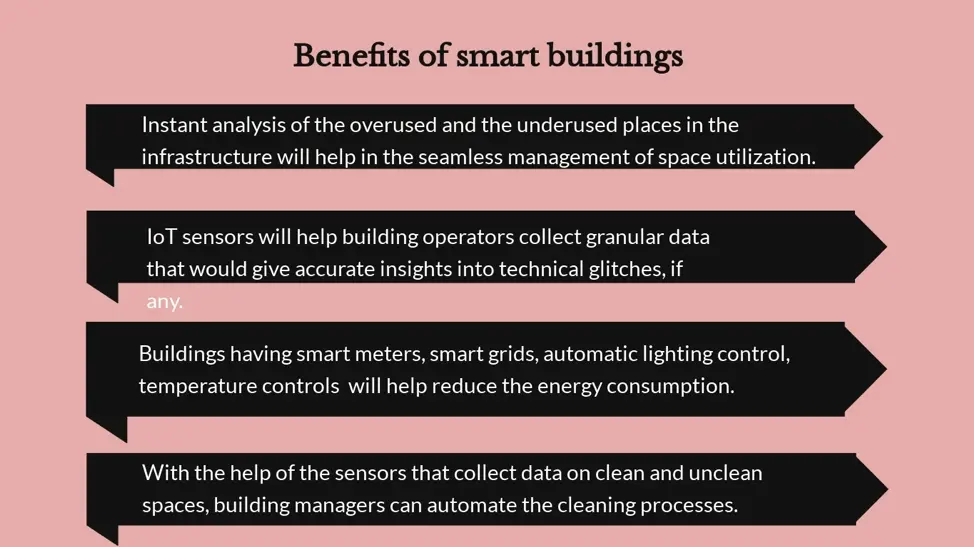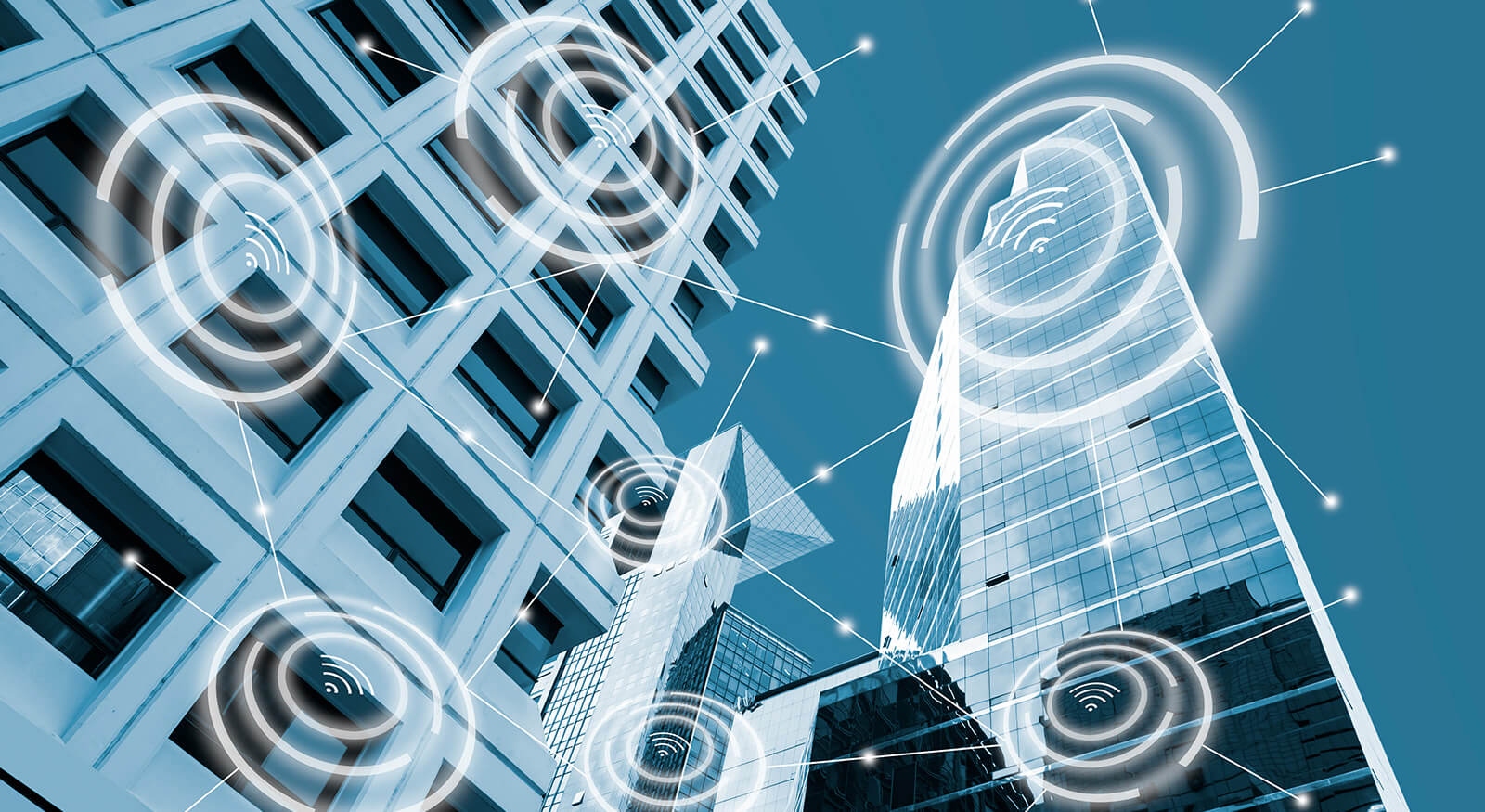Safety and security at its best, automatic temperature control, and smart lighting control - what if your buildings get smart enough and offer all of this? Does it seem like a fantasy? It's no longer a fantasy, smart buildings are coming soon!
Imagine the building that was built primitively. Probably, they were made from stones, grass, mud, sticks, or other natural materials. Buildings today we see, are way more luxurious, comfortable, and improved. Over time, we see how buildings have transformed, developed, and upgraded into comfortable structures. While the primitive structures don’t really resemble the buildings of today, the purpose of both the structures are the same. And, the aim behind buildings is to provide shelter, along with the comfort and peace of mind of course.
Taking the current scenario into consideration, people are highly demanding and impatient today. They demand everything to be delivered accurately within minimal time. The hunger for increased comfort and convenience is increasing day-by-day. Realizing people’s needs, the building owners are finding new ways to align the priorities for gaining customer satisfaction.
Today due to the modern-age technologies, meeting people’s demands is no more an issue. All you need to have is good knowledge of how technologies can be used appropriately. Taking a cue from the concept of smart cities and smart homes, construction sectors are trying to build connected and digitized buildings. Again, the idea of smart buildings was to provide comfort, convenience, security, and efficiency. But, what are ‘smart’ buildings?
What Are Smart Buildings?
Smart building are structures that use digital technologies to automate, streamline, and improve internal building operations. In simpler words, smart buildings are nothing but transforming buildings in such a way they interact with the cloud. The infrastructure uses sensors, cameras, actuators to increase the structure reliability. At the time of emergencies, the buildings will analyze and respond accordingly.
Most of the buildings today are already deploying CCTV cameras, fire protection sensors, LED lighting retrofits. But with IoT, buildings can share comprehensive data that can help the building owners gain meaningful insights that would improve tenants experience, thereby enhancing ROI than the current applications.
What Are the Benefits of Smart Buildings?
Since smart buildings are centered around various technologies, they cannot anymore be looked upon as ‘four walls and a roof.’ They should actually be referred to as ‘automated machines.’ With a simple touch on your smartphones, you can get the information about available free parking spaces. Or, if there is any technical glitch in the lift before it gets too late, the message will be sent automatically to the service officer. Opportunities are boundless, but let’s check on the specific benefits of smart buildings.

- Efficiency - Sensors embedded at every corner of the building will gather comprehensive data on the working of the building. The building operators will get real-time information on the active conditions of structures. Instant analysis of the overused and the underused places in the infrastructure will help in the seamless management of space utilization.
- Predictive maintenance - In the life cycle of any structure, the maintenance of buildings eats up a major bulk of the budget. But the infusion of IoT sensors will help building operators collect granular data that would give accurate insights into technical glitches if any. The insights drawn from the collected data can help the structure inspectors to analyze issues in real-time, carry out prompt service required for building maintenance, and reduce the maintenance costs tremendously.
- Energy consumption - Buildings having smart meters, smart grids, automatic lighting control, temperature controls, and other energy management systems will help reduce the energy consumption to significant levels. Beyond energy savings, smart buildings will assist in financial savings too.
- Optimized building wash - With the help of the sensors that collect data on clean and unclean spaces, building managers can automate the cleaning processes. Instant notification will be sent to both the building managers and the cleanliness department. Such a feature will help in keeping the building clean and safe from diseases.
What Are the Different Scenarios of Smart Buildings?
Smart schools - School classrooms should have an environment that is safe and comfortable for teachers as well as students. Making the classrooms more comfortable will enhance student and teacher experience, productivity, and performance, no doubt. By deploying IoT sensors, intelligent gateway, people counters, actuators, cameras, utility meters, solar panels, schools can build an ‘intelligent’ building that improves visibility, security, and management while bringing new opportunities in financial savings. Schools can:
- take care of the temperature changes,
- check for low lighting,
- enhance student safety,
- lower energy consumption, and
- monitor water management.
Smart workplaces - In the office, there is always an employee sitting in one corner with an extra jacket on for warmth, while in another corner there might be employees who are sweating. Office temperature depends on numerous factors, including the number of workers, sunlight, and humidity. The existing ventilation ducts are not synchronized with employee preferences. But in smart buildings, by combining the employee preferences, data collected by the current HVAC system and ML capabilities, the building managers will get optimized temperature information based on employee comfort. Occupants can also control the temperature by having an app installed on their smartphones. High-level transparency will be seen, where employees would get the freedom to control workplace temperatures. Also, the smart parking system, visitor management system, energy metering, streamlined cleaning, smart waste management, thermal comfort will create a comprehensive smart environment at the workplace, thereby enhancing employee health, productivity, safety, concentration, and efficiency at work. The survey says that “improved ventilation will boost the productivity of workers by 11% while better lighting will spark a whopping 23% jump in efficiencies.” Hence, developing smart workplaces will enhance employee engagement.
Smart hospitals - Providing better medical facilities, comfort, care, and security to patients will make hospitals become the prime-time players among other hospitals. However, IoT, advanced technologies, and automation have opened up new opportunities for hospitals to fulfill patient expectations while improving the building connectivity. Schedule to automatically switch off lights when not required, control room temperatures according to patient’s requirements, send messages for cleaning, notify the technical team about a medical device glitch, monitoring every occupied space. These benefits, plus energy savings, reliable building cabling, and infrastructure optimization will make hospitals smarter, sustainable, and active. Most importantly, smart hospitals will create an optimal environment where patients will feel more cozy, exactly as they feel at home. In today’s world, comfort is the reigning king and convenience is the throne.
And smart buildings offer limitless promise and opportunities in providing both of these, along with extra safety, security, and efficiency. Smart buildings will most importantly maximize the flow of revenues for building constructors and end users alike. By extracting value from the smart building ecosystem, builders can enjoy exciting ROI benefits and tenants can customize the services according to their wish and budget. However, the dream of smart buildings cannot be accomplished overnight. Requirements and challenges should be analyzed regularly and gaps should be filled appropriately. With the right strategy, smart people, agile infrastructure, enough funds, and high-level security, the efforts of making buildings intelligent will be successful, for sure.




Leave your comments
Post comment as a guest